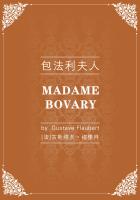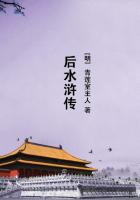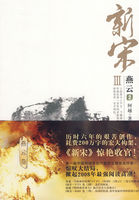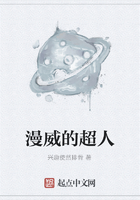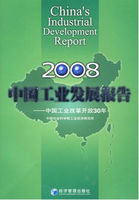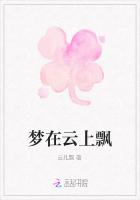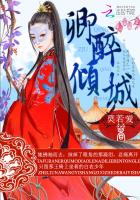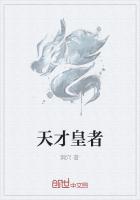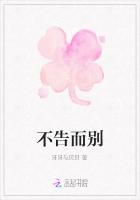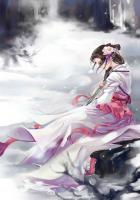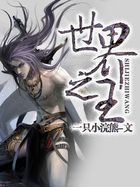The bedr oom which sh e shared w ith some of the childre n formed h er retreat more continually than ever.Here, under her few square y ards of thatch, she watched winds, and snows, and rains, gorg eous sunsets, and successiv e moons at their full.So close kept she that at length almost everybody thought she had gone away.
The only exercise that Tess took at this time was after dark; and it was then, when out in the woods, that she seemed least solitary.She knew how to hit to a h air's-breadth that moment of evening when the light and the darkness are so evenly balanced that the cons traint of day and the suspense of nig ht neutralize each other, leaving absolute mental liberty.It is then that the pl ight of being alive becomes attenuated to its least possible dimensions.She had no fear of the shadows; her sole idea seemed to be to shun mankind—or rather that cold ac cretion called the world, which, so terrible in the mass, is sounformidable, even pitiable, in its units.
On these lonely hills and dales her quiescent glide was of a piece with the element she moved in.Her flexuous and stealthy figure became an integral partof the scene.At tim es her whimsical fancy would intensify natural pro cesses around her till they seemed a p art of her own story.Rather they became a part of it; for the world is only a psychological phenomenon, and what they seemed they were.The midnight airs and gusts, moaning amongst the tightly-wrapped buds and bark of the winter twigs, were formula of bitter reproach.A wet d ay was the expr ession of irremediable grief at her weakness in the mind of some vague ethical being whom sh e cou ld not class d efinitely as the God of h er childhood, and could not comprehend as any other.
But this en compassment of her own characterization, based o n shreds of convention, peopled by phantoms and voices antipathetic to h er, was a so rry and mistaken creation of Tess's fancy—a cloud of moral hobgoblins by which she was terrified without reason.It was they that were out of harmony with the actual wor ld, not she.Walking among th e sleeping birds in the hed ges, watching the skipping rabbits on a m oonlit warren, or standing under a pheasantladen bough, sh e look ed up on herself as a figure o f Guilt intrud ing into the haunts of Innocence.Bu t all the while s he was making a distinction where there was no difference.Feeling herself in antagonism she was quite in accord.She had been made to break an accepted social law, but no law known to the environment in which she fancied herself such an anomaly.
14
It was a hazy sunrise in Augu st.The den ser nocturn al vapours, attacked by the warm beams, were dividing and shrinking into isolated fleeces within hollows and coverts, where they waited till they should be dried away to nothing.
The sun, on account of the mist, had a cur ious sentiment, personal look, demanding the masculin e pronoun for its adequ ate expr ession.His presen t aspect, coupled with the lack of all human forms in the scene, explained the old-time heliolatries in a m oment.One could f eel that a saner relig ion had never prev ailed under th e sky.The luminary was a golden-haired, b eaming, mild-eyed, God-like creature, gazin g down in the vigour and intentn ess of youth upon an earth that was brimming with interest for him.
His light, a little later, broke through chinks of cottage shu tters, throwing stripes like red-hot pokers upon cu pboards, ch ests of dr awers, and o ther furniture within; and awakening harvesters who were not already astir.
But of all ruddy things that morning the brightest were two broad arms of painted woo d, which ro se fro m the margin of a y ellow co rnfield hard by Marlott village.They, with two o thers below, fo rmed th e revolving Maltese cross of the reaping-machine, which had been brought to the field on the previous evening to be ready for operations this day.The paint with which they were smeared, intensified in hue by the sun light, imparted to them a look of having been dipped in liquid fire.
The field had already been“opened”; that is to say, a lane a few feet wide had been hand-cut through the wheat along the whole cir cumference of th e field, for the first passage of the horses and machine.
Two groups, one of men and lads, the other of women, had come own the lane just at the hour when the shado ws of the eastern hedge-top struck the west hedge midway, so that the heads of the groups were enjoy ing sunrise while their feet were still in the dawn.Th ey disappeared fro m the lane between the two stone posts which flanked the nearest field-gate.
Presently th ere arose fr om with in a tic king like the lovemaking of the grasshopper.The machine had begu n, and a moving concatenatio n of th ree horses and the aforesaid long rick ety m achine was visible over the gate, a driver sitting upon one of the hauling horses, and an attendant on the seat of the implement.Along one side of th e field th e whole wain went, the arms of the mechanical r eaper re volving slowly, t ill it p assed down the hi ll qui te ou t o f sight.In a minute it came up on the other side of the field at the same equable pace; the glistening brass star in the forehead of the fore horse first catching the eye as it ros e in to v iew over th e stu bble, then th e brigh t arms, and then the whole machine.
The narrow lane of s tubble encompassing the f ield grew wider with each circuit, and the standing corn was reduced to s maller area as the morning wore on.Rabbits, hares, snak es, rats, mice, re treated inwards as into a fastness, unaware of the ephemeral nature of their refuge, and of the d oom that awaited them later in the day when, their covert shrinking to a more and more horrible narrowness, they were huddled together, friends and foes, till the last few yards of upright wheat fell also under the teeth of the unerring reaper, and they were every one put to death by the sticks and stones of the harvesters.
The reaping-machine left the fallen corn behind it in little heaps, each heap being of the quantity for a sheaf; and upon these the active binders in the rear laid thei r hands—mainly wo men, bu t so me of th em men in print shir ts, andtrousers sup ported round their waists by leather s traps, render ing useiess the two buttons behind, wh ich twinkled and bristled with sunb eams at every movement of each wear er, as if the y were a pair of ey es in the small of his back.
But those of the oth er sex were the most interesting of th is company of binders, by reason of th e char m wh ich is acquired by wo man when she becomes par t and p arcel of outdoor nature, and is no t merely an object set down therein as at ord inary tim es.A field-man is a perso nality afield; a field-woman is a portion of the field; she has somehow lost her own mar gin, imbibed the essence of her surrounding, and assimilated herself with it.
The wo men—or rath er girls, fo r th ey were m ostly y oung—wore drawn cotton bonnets with gr eat flapping curtains to keep off the sun, and glov es to prevent their hands being wounded by the stubble.There was one wearin g a pale pink jacket, another in a cream-coloured tight-sleeved gown, another in a petticoat as red as the ar ms of the reaping machine; and o thers, older, in the brown-rough“wropper”or overall—the old-established and most appropriate dress of the field-wo man, which th e y oung on es were abandoning.This morning the eye returns involuntarily to the girl in the pink cotton jacket, she being the most flexuous and finelydrawn figure o f them all.But her bonn et is pulled so far over her br ow that none of her face is disclosed while she binds, though her complexion may be gu essed fro m a stray tw ine or two of dark brown hair which exten ds below the curtain of her bonnet.P erhaps one reason why she seduces casual attention is that she never courts it, though the other women often gaze around them.
Her binding proceeds with clock-like monotony.From th e sheaf las t finished she draws a handful of ear s, patting th eir tips with her left p alm to bring th em even.Th en stooping low she m oves forward, gather ing th e corn with both hands against her knees, and pushing her left gloved hand under th e bundle to meet the right on the other side, holding the corn in an embrace like that of a lover.She br ings the ends of the bond together, an d kneels on the sheaf while she ties it, beating back her skirts now and then when lifted by the breeze.A b it of her n aked ar m is visible be tween the buff lea ther of the gauntlet and the sleeve of her gown; and as th e day wears on its femin inesmoothness becomes scarified by the stubble, and bleeds.
At intervals she stands up to rest, and to retie her disarranged apron, or to pull her bonnet straight.Then one can see the oval face of a handsome young woman with deep dark eyes and lon g heavy clinging tresses, which seem to clasp in a beseeching way anything they fall against.The cheeks are paler, the teeth more regular, the red lips thinner than is usual in a country-bred girl.
It is Tess Durbey field, o therwise d'Urberville, s omewhat ch anged—the same, but not the same; at the present stage of her existence living as a stranger and an alien here, tho ugh it was no strange land that she was in.After a long seclusion she had co me to a reso lve to undertake outdoor wo rk in her native village, the busiest season of the y ear in the agr icultural world having arrived, and nothing that she could do within the house being so rem unerative for the time as harvesting in the fields.
The movements of the other women were m ore or less similar to Tess's, the whole b evy of them drawing to gether like dancers in a quadrille at th e completion of a sheaf by each, every one placing her sheaf on end against those of the rest, till a shock, o r“stitch”as it was here c alled, of ten or a dozen wa s formed.
They went to breakfast, and came again, and the work proceeded as before.As the hour of eleven dr ew near a person watching her might have noticed that every now a nd then Tes s's glance f litted wis tfully to the brow of the hill, though she did not pause in her sheafing.On the verge of the hour the heads of a group of children, of ages ranging from six to fourteen, rose about the stubbly convexity of the hill.
The face of Tess flushed slightly, but still she did not pause.
The eldest of the co mers, a girl who wore a triangular shawl, its corner
draggling on the stubble, carried in her ar ms what at first sight seemed to be a doll, but pro ved to be an infant in long clothes.Another brought some lunch.The harvesters ceased working, took their provisions, and sat down against one of the shocks.Here they fell to, the men playing a stone jar freely, and passing round a cup.
Tess Durbeyfield had been one of the last to suspend her labours.She sat down at th e end of the shock, her face turned somewhat away from hercompanions.When she had deposited herself a man in a rabbit-sk in cap and with a red handkerchief tucked into his belt, held the cup of ale over the top of the sho ck for her to dr ink.But she d id no t accept h is off er.As soon as her lunch was spread she called up the b ig girl her sister, and took the baby of her, who, glad to be relieved of the burden, went away to the next shock and joined the other children playing there.Tess, with a curiously stealthy yet courageous movement, and with a still r ising colour, unf astened her fr ock and began suckling the child.
The men who sat nearest considerately turned their faces towards the other end of the field, some of them b eginning to smoke; one, with absen t-minded fondness, regretfully stroking the jar that would no longer y ield a stream.All the women but Tess fell into animated talk, and adjusted the disarranged knots of their hair.
When the infant had taken its fill the young mother sat it upright in her lap, and looking into the far distance dandled it with a gloomy indifference that was almost dislike; then all of a sudden sh e fell to violently kissing it some dozens of times, as if she cou ld never leave off, the ch ild crying at th e vehemence of an onset which strangely combined passionateness with contempt.
“She's fond of that there child, though she mid pretend to hate en, and say she wishes the baby and her too were in the churchyard, ”observed the woman in the red petticoat.
“She'll soon leave off say ing that, ”replied th e one in buff.“Lord, 'tis wonderful what a body can get used to o'that sort in time!”
“A litt le more th an pers uading had to do wi'the co ming o't, I rec kon.There were they that heard a sobbing one nigh t last y ear in The Chase; and it mid ha'gone hard wi'a certain party if folks had come along.”
“Well, a little m ore, or a little less, 'twas a thousand pities th at it shou ld have happened to she, of all others.But'tis always the c omeliest!The plain ones be as safe as churches—hey, Jenny?”The speaker turned to one of the group who certainly was not ill-defined as plain.
It was a thousand pities, indeed; it was impossible for even an enemy to feel otherwise on looking at Tess as she sat ther e, with her flo wer-like mouth and large tender eyes, neither black nor blue nor gray nor violet; rather all thoseshades together, and a h undred others, which cou ld be seen if one looked into their irises—shade behind shade—tint beyond tint—around pupils that had no bottom; an almost stan dard wo man, but for the slig ht incautiousness of character inherited from her race.
A resolution which had surprised herself had brought her into the fields this week for the first time during many months.After wearing and wasting her palpitating h eart with ev ery engine of regret that lonely inexperien ce co uld devise, common-sense had illumined her.She felt that she wo uld do well to be useful again—to taste anew sweet independence at any price.The past was past; whatever it had been it was no more at hand.Whatever its consequences, time would close over them; they would all in a few y ears be as if they had n ever been, and sh e herself grassed down and forgotten.Meanwhile the trees were just as green as before; the birds sang and the sun shone as clearly now as ever.The familiar surroundings had not d arkened because of her gr ief, nor sickened because of her pain.
She might have seen that what h ad bowed her head so profoundly—the thought of the world's concern at her situation—was founded on an illusion.She was not an existence, an experience, a passion, a structure of sensations, to anybody but herself.To all humankind besides Tess was only a passing thought.Even to friends she was no more than a frequently passing thought.If she made herself miserable the livelong night and day it was only this much to them—“Ah, she makes herself unhappy.”If she tried to be cheerful, to dismiss all care, to take p leasure in the daylight, the flowers, the b aby, she cou ld only be this idea to them—“Ah, she bears it very well.”Moreover, alon e in a desert is land would she have been wretched at what had happened to her?Not greatly.If she could have been but just created, to discover herself as a spouseless mother, with no experience of life except as the parent of a nameless child, would the position have caused her to desp air?No, she would hav e taken it calmly, and found pleas ures th erein.Most of the misery had been g enerated by her conventional aspect, and not by her innate sensations.
Whatever Tess's reasoning, some spirit had induced her to dress herself up nearly as sh e had formerly done, and come out into the fields, harvest-hands being greatly in dem and just then.This was why she had borne herself w ithdignity, and had looked people calmly in the face at times, even when h olding the baby in her arms.
The harvest-men rose from the shock of corn, and stretched their limbs, and extinguished their pipes.The horses, which had been unharnessed and fed, were again attached to the scarlet machine.Tess, having quickly eaten her own meal, beckoned to her e ldest sister to come and take away the baby, fastened her dress, put on the buff gloves again, and stoop ed anew to draw a bond from the last completed sheaf for the tying of the next.
In the af ternoon and evening the p roceedings of the morning were conti-nued, Tess staying on till dusk with th e body of harvesters.Then they all rode home in one of the largest wagons, in the company of a broad tarn ished moon that had risen from the ground to the eastwards, its face resembling the outworn gold-leaf halo of so me wormeaten Tuscan sain t.Tess's female co mpanions sang songs, and showed themselves very sympathetic and glad at her reappea-rance out of doors, though they could not refrain from mischievously throwing in a few verses of the ballad about the maid who went to the merry green wood and came back a ch anged state.There are counterpoises and compensations in life; and the event wh ich had made of her a social warn ing had also for the moment made her the most interesting personage in the village to many.Their friendliness won her st ill far ther away from her self, their lively spirits were contagious, and she became almost gay.
But now that her moral sorrows were passing away a fresh o ne arose on the natural side of her which knew n o social law.When she reached home it was to learn to her grief that th e baby had been suddenly taken ill s ince the afternoon.Some such collapse had been probable, so ten der and puny was its frame; but the event came as a shocknevertheless.

